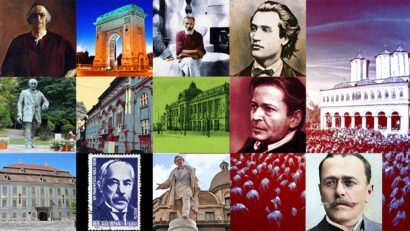Ioan Bianu (1856-1935)
The Library of the Romanian Academy appeared in 1867

Steliu Lambru, 06.09.2025, 13:41
The cultural institutions of the modern Romanian state continued what had existed, but new ones were established from scratch, from the ambitions and dedication of some enthusiasts. One of these cultural institutions that gained prestige was the Library of the Romanian Academy, and one of the enthusiasts who linked his name to it was the director Ioan Bianu.
The Library of the Romanian Academy appeared in 1867, with the emergence of the Romanian Academy, and the first funds of the Library appeared from donations by Romanian and foreign cultural figures. In addition to donations, the development of the Library was done through purchase and international exchange. The first institution to engage in the exchange of printed matter with the Library of the Romanian Academy was the Royal Danish Society of Sciences in 1870. 18 years after the establishment of the Library, in 1885, the Law of Legal Deposit came into force, stipulating that three copies of everything printed on Romanian territory be sent to the Library of the Romanian Academy.
The first director of the Library and the one who organized it was Ioan Bianu. Being of Romanian origin from Transylvania, born in 1856, Bianu was of the Greek Catholic denomination and had attended high school in Blaj. After his high school studies, he settled in Romania, and graduated from the Faculty of Letters of the University of Bucharest. He studied in Milan, Madrid and Paris, became a professor at the Faculty of Letters and Philosophy of the University of Bucharest and, in 1884, was appointed director of the Library. Nicolae Noica is the current director of the Romanian Academy Library, and he showed the dedication with which the first head of the institution built it starting in 1884.
“Ioan Bianu fused his existence with that of the institution he founded and led until the end of his life. For more than 50 years, he headed the Academy Library, he was at the helm of the Academy Library, which he enriched through personal efforts. He launched public appeals to procure printed books, publications, manuscripts, prints, portraits, all of this in order to have at hand the study of the nation’s past, of the language and literature through which a society can know its history.”
Ioan Bianu, with his meticulousness, was aware that only a well-equipped, well-organized, well-managed and well-defended cultural institution could provide researchers with what they needed. “His activity as a ‘guardian of the book’, as he was called, who vigilantly watched over the treasures of the Library is evidenced by the incident of April 1915, when he refused to give Princess Marioara, daughter of King Ferdinand, the first volume of the work Inscriptions, which was in a single copy in the Library. Then, another special moment is the episode in 1917 when, in the capital occupied by German troops, Bianu was imprisoned in his apartment, which was at the Academy. The enemies ransacked the Old Manuscript Fund and impoverished it. Bianu refused to sign the act of surrender, because he was not allowed to record his protest, and the manuscripts ended up in Sofia, finally returning to the country in 1918-1920.”
Integrity is a condition without which one cannot build something of quality, being truly decisive in a team with other people of the same character. This is how it is today, and it was also in the time of Ioan Bianu. Here is Nicolae Noica.
“I would like to emphasize in particular the integrity of this distinguished intellectual. It is not surprising that precisely on these coordinates of the seriousness of concrete facts and high ideals, Bianu met another kindred spirit, Anghel Saligny. Moreover, their collaboration is also evident from a letter that Bianu sent to Saligny on January 11, 1911. Ioan Bianu said that Anghel Saligny was accustomed to organizing and leading large services, where the attributions and responsibilities had to be clearly defined. And, as president of the Academy, seeing the weaknesses and shortcomings of the services, developed and organized patriarchally, as it was then, Saligny brought corrections and improvements with the greatest discretion.”
The qualities of a good administrator are seen in those who are dedicated to their activity, which is, in fact, a passion. Ioan Bianu also knew the dangers that lurk for people in office, dangers that can be fatal for the institutions in which they work. Nicolae Noica once again.
“In 1907, the administration of the Romanian Academy was established, and Ioan Bianu was entrusted with its coordination as general director. He was director of the Library and director of the administration, and was devoted to his mission until the last moment of his life. Bianu asked in a testamentary letter that they be served with honor and be protected from abuses which, quote, morally and materially destroys both institutions of all kinds in this beautiful and rich homeland of ours, unquote, as well as taking care of the formidable assets that are found at the Academy Library.”
Ioan Bianu died in 1935, 90 years ago, after leading the Library of the Romanian Academy through periods of extensive transformations of the Romanian state and society. His directorship is a landmark, not only for the memory of the institution, but also of an era marked by strong constructive momentum.




























